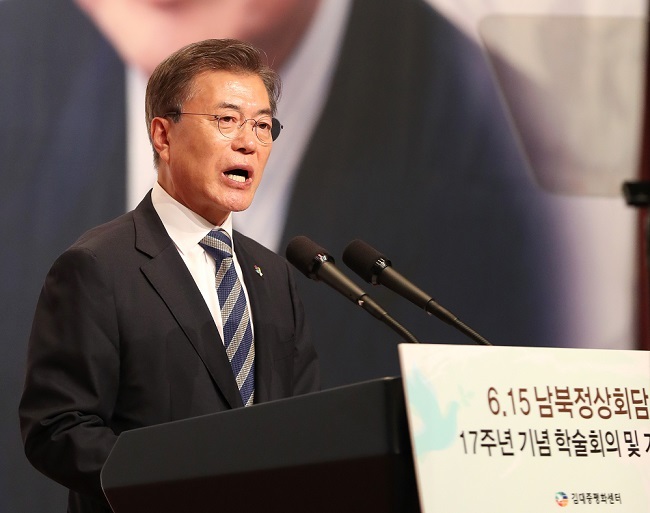President Moon Jae-in said Thursday he would pursue talks with North Korea if it halts nuclear and missile tests, heralding a sweeping turnaround in Seoul’s policy that has long centered on sanctions and pressure.
Marking the 17th anniversary for a watershed inter-Korean peace declaration in 2000, Moon made a first dialogue offer for the first time since taking office just about a month ago.
He even displayed his willingness to hold parallel negotiations on denuclearization and a peace treaty --something Beijing has called for but Seoul has refused -- in return for a moratorium on weapons experiments.

President Moon Jae-in (Yonhap)
“I make it clear that if North Korea ceases additional nuclear and missile provocations, we could come forward for dialogue without any conditions. I urge the North to respond,” he said at a ceremony hosted in Seoul by the Kim Dae Jung Peace Center, founded by the deceased president and now headed by his wife Lee Hee-ho.
“I am willing to discuss, sitting knee to knee and putting our heads together, how we will implement the existing inter-Korean agreements. We will be able to talk comprehensively about the complete dismantling of North Korea’s nuclear program, the establishment of a peace regime on the peninsula, and even the normalization of North Korea-US relations.”
The speech marked a departure from 10 years of hard-line policy under the conservative administrations of Lee Myung-bak and Park Geun-hye. Moon’s inauguration has bred hopes for a thaw with the headstrong neighbor but the administration has not presented its terms for talks so far.
The June 15 North-South Joint Declaration was an outcome of the unprecedented summit between Kim Dae-jung and Kim Jong-il. The five-point statement calls for efforts for an independent unification without “external intervention”; recognizing the commonality between the South’s vision for a confederation and the North’s proposal for a low-level federation; resolving humanitarian issues such as separated families and political prisoners; greater economic and sociocultural cooperation; and sustained formal dialogue.
The event led to a second inter-Korean summit in 2007 between Roh Moo-hyun and Kim Jong-il, which culminated in the Oct. 4 Declaration.
The declaration was a more comprehensive statement also touching on military hostilities, 2005 and 2007 denuclearization accords and a peace treaty to replace the existing armistice.
Moon, who was a longtime friend and top aide to Roh, expressed bitterness the sides’ failure to follow through on the past accords. Had the North not commit military provocations and the South made efforts to translate them into law, Seoul’s North Korea policy may not have been “going back and forth” according to leadership changes, he said.
“If North Korea decides to relinquish its nuclear program, it would be a sign that shows its resolve to enforce the agreements. If it does so, we will actively help,” Moon said.
He nonetheless pledged to uphold Kim Dae-jung’s resolve to develop cross-border ties while maintaining the principle that Seoul will not accept Pyongyang’s nuclear weapons and provocations.
“Above all, his made biggest strides in inter-Korean reconciliation, peace and the Sunshine policy,” Moon said.
“He showed that we could be in the driver’s seat and steer the peninsula issues based on collaboration with neighbors. … He ushered in an era for inter-Korean reconciliation and cooperation even in a security crisis set off by the North’s provocative behavior.”
The Unification Ministry also issued a statement calling for the sides to respect and implement the June 15 declaration, saying its spirit bore much significance despite heightened tension.
“As the first agreement between the two Koreas’ leaders since the national division, the declaration provided a chance to open a new horizon for reconciliation and cooperation by initiating dialogue and exchanges in various areas and setting out to resolve the issues of separate families,” the statement reads.
The North, in contrast, continued to press for a shift in Seoul’s North Korea policy. While lauding the declaration as the “best signpost for peace, unification and people’s prosperity,” the Rodong Sinmun, a ruling Workers’ Party mouthpiece, ran on its front page a statement released by the North’s Committee for the Peaceful Reunification of Korea.
In the statement, the committee in charge of cross-border affairs urged the Moon administration to first take steps to ease military tension before floating a thaw, lambasting its parallel pursuit of sanctions and engagement as “foolish, disgraceful” and “self-deception.”
“If South Korea truly desires peace they should not recklessly take issue with our self-defensive nuclear power, which is the firmest and most realistic guarantee for peace on the peninsula, but take measures to shut out the US’ aggressive, hostile blind act,” the statement said.
In Gwanghwamun, downtown Seoul, dozens of officials and ordinary citizens participated in a separate ceremony held by the South’s unit of a committee launched in both sides to enforce the declaration.
The organization had initially pushed for a joint event in Kaesong, North Korea, as it did back to back in Seoul and Pyongyang from 2003-08, but the plan failed to materialize amid Pyongyang’s aloof attitude.
“The North Korea policy and inter-Korean relations for the past 10 years are a result of mistrust and hostility,” said Lee Chang-bok, standing chair of the June 15 South Korean Committee.
“But we are also struggling to grasp the current government’s linkage of sanctions and civilian exchanges with the North. ... We urge the government to take bold steps to restore inter-Korean relations and peace and cooperation regardless of the global environment.”
By Shin Hyon-hee (
heeshin@heraldcorp.com) and Jung Min-kyung (
mkjung@heraldcorp.com)






